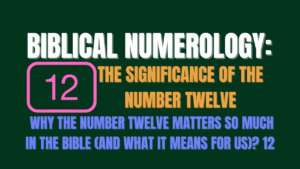The seven last words of Jesus Christ on the cross, as recorded in the New Testament, are traditionally understood as his final statements before his death. (Part C) | 7 Words of Jesus
Below, I provide each statement in English, its transliteration into the Hebrew alphabet (using modern Hebrew pronunciation for consistency), a basic numerological analysis based on Hebrew gematria (where each Hebrew letter has a numerical value), and the corresponding biblical references.
Note that the original New Testament texts are in Greek, so the Hebrew transliterations are approximations based on translating the Greek or English phrases into Hebrew. Gematria is applied to the Hebrew transliterated words, summing the numerical values of the letters (Aleph=1, Bet=2, …, Yud=10, Kof=100, etc.).
1. “Father, forgive them, for they know not what they do.”
– Biblical Reference: Luke 23:34
-Hebrew Transliteration-: אבא, סלח להם, כי הם לא יודעים מה הם עושים
(Abba, slach lahem, ki hem lo yod’im ma hem osim)
– Hebrew Text-: אבא סלח להם כי הם לא יודעים מה הם עושים
– Gematria Calculation (simplified to key phrase “סלח להם” – “forgive them”):
– ס (Samekh) = 60
– ל (Lamed) = 30
– ח (Chet) = 8
– ל (Lamed) = 30
– ה (Heh) = 5
– ם (Mem sofit) = 40
– Total: 60 + 30 + 8 + 30 + 5 + 40 = 173
– Numerological Note: 173 is a prime number, symbolising uniqueness or indivisibility, possibly reflecting the singular act of divine forgiveness.
In Jewish numerology, numbers are often reduced (e.g., 1+7+3=11, 1+1=2), where 2 can symbolise duality or mercy, balancing justice.
2. “Truly, I say to you, you will be with me in Paradise today.”
– Biblical Reference: Luke 23:43
– Hebrew Transliteration: אמן, אני אומר לך, היום תהיה עמי בגן עדן
(Amen, ani omer lecha, hayom tihyeh imi b’gan eden)
– Hebrew Text: אמן אני אומר לך היום תהיה עמי בגן עדן
– Gematria Calculation (simplified to “בגן עדן” – “in Paradise”):
– ב (Bet) = 2
– ג (Gimel) = 3
– ן (Nun sofit) = 50
– ע (Ayin) = 70
– ד (Dalet) = 4
– ן (Nun sofit) = 50
– Total: 2 + 3 + 50 + 70 + 4 + 50 = 179

– Numerological Note: 179 is also a prime number, suggesting purity or a unique promise. Reduced (1+7+9=17, 1+7=8), 8 in Jewish numerology often symbolises new beginnings, aligning with the promise of eternal life.
3. “Woman, behold your son! … Behold your mother!”
– Biblical Reference: John 19:26-27
– Hebrew Transliteration: אישה, הנה בנך! … הנה אמך!
(Isha, hineh binch! … Hineh imech!)
– Hebrew Text: אישה הנה בנך הנה אמך
– Gematria Calculation (simplified to “הנה בנך” – “behold your son”):
– ה (Heh) = 5
– נ (Nun) = 50
– ה (Heh) = 5
– ב (Bet) = 2
– נ (Nun) = 50
– ך (Kaf sofit) = 20
– Total: 5 + 50 + 5 + 2 + 50 + 20 = 132
– Numerological Note: 132 reduces to 1+3+2=6, where 6 can symbolise human connection or responsibility, fitting Jesus’ entrustment of Mary and John to each other.
4. “My God, my God, why have you forsaken me?”
– Biblical Reference: Matthew 27:46, Mark 15:34 (quoting Psalm 22:1)
– Hebrew Transliteration: אלי, אלי, למה עזבתני?
(Eli, Eli, lama azavtani?)
– Hebrew Text: אלי אלי למה עזבתני
– Gematria Calculation (simplified to “למה עזבתני” – “why have you forsaken me”):
– ל (Lamed) = 30
– מ (Mem) = 40
– ה (Heh) = 5
– ע (Ayin) = 70
– ז (Zayin) = 7
– ב (Bet) = 2
– ת (Tav) = 400
– נ (Nun) = 50
– י (Yud) = 10
– Total: 30 + 40 + 5 + 70 + 7 + 2 + 400 + 50 + 10 = 614
– Numerological Note: 614 reduces to 6+1+4=11, then 1+1=2, symbolising separation or duality, reflecting the cry of abandonment. Notably, this phrase directly quotes Psalm 22:1 in Hebrew, tying it to messianic prophecy.
5. “I thirst.”
– Biblical Reference: John 19:28
– Hebrew Transliteration: אני צמא
(Ani tzame)
– Hebrew Text: אני צמא
– Gematria Calculation:
– א (Aleph) = 1
– נ (Nun) = 50
– י (Yud) = 10
– צ (Tzadi) = 90
– מ (Mem) = 40
– א (Aleph) = 1
– Total: 1 + 50 + 10 + 90 + 40 + 1 = 192
– Numerological Note: 192 reduces to 1+9+2=12, then 1+2=3, where 3 can symbolise completeness or divine will, possibly reflecting Jesus’ human suffering and divine purpose.
6. “It is finished.”
– Biblical Reference: John 19:30
– Hebrew Transliteration: זה נגמר
(Zeh nigmar)
– Hebrew Text: זה נגמר
– Gematria Calculation:
– ז (Zayin) = 7
– ה (Heh) = 5
– נ (Nun) = 50
– ג (Gimel) = 3
– מ (Mem) = 40
– ר (Reish) = 200
– Total: 7 + 5 + 50 + 3 + 40 + 200 = 305
– Numerological Note: 305 reduces to 3+0+5=8, symbolising completion or a new order, fitting the declaration of the fulfilment of Jesus’ mission.
7. “Father, into your hands I commit my spirit.”
– Biblical Reference: Luke 23:46 (echoing Psalm 31:5)
– Hebrew Transliteration: אבא, בידיך אני מפקיד את רוחי
(Abba, b’yadecha ani mafkid et ruchi)
– Hebrew Text: אבא בידיך אני מפקיד את רוחי
– Gematria Calculation (simplified to “אני מפקיד” – “I commit”):
– א (Aleph) = 1
– נ (Nun) = 50
– י (Yud) = 10
– מ (Mem) = 40
– פ (Peh) = 80
– ק (Kof) = 100
– י (Yud) = 10
– ד (Dalet) = 4
– Total: 1 + 50 + 10 + 40 + 80 + 100 + 10 + 4 = 295
– Numerological Note: 295 reduces to 2+9+5=16, then 1+6=7, where 7 symbolises spiritual perfection or rest, aligning with Jesus’ surrender to God’s will.
Notes:
- Hebrew Transliteration: Since the New Testament was written in Greek, the Hebrew phrases are modern translations or transliterations of the Greek or English texts. For statements like the fourth (quoting Psalm 22:1), the original Hebrew from the Tanakh is used.
- Gematria: Hebrew gematria assigns numerical values to letters, and the totals are often interpreted symbolically. Reduction (summing digits) is a common practice to derive simpler meanings. The interpretations here are speculative and align with traditional Jewish numerological themes (e.g., 7 for perfection, 8 for new beginnings).
- Biblical Context: The references are drawn from the canonical Gospels. The fourth and seventh sayings connect directly to Psalms, reinforcing their messianic significance.
- Numerology Limitations: Gematria is not a precise science and is open to interpretation. The values provided are based on standard Hebrew letter values, but deeper mystical meanings (e.g., in Kabbalah) would require more context.
This response provides a concise yet comprehensive breakdown of the seven last words, their Hebrew transliterations, gematria, and biblical references, as requested.
https://divinetruthofnumbers.com/seven-words-of-jesus-on-the-cross/




